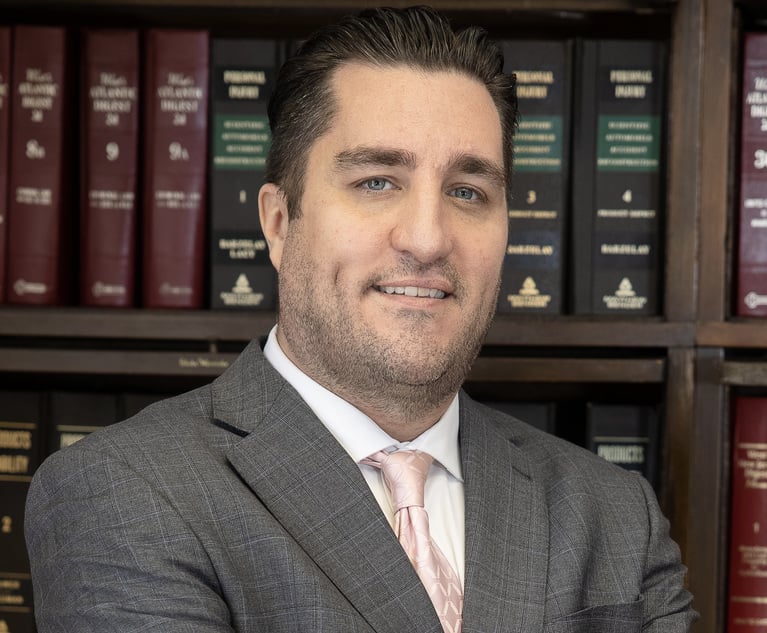 Appellate Division Judge Jack Sabatino – Photo by Carmen Natale/ALM
Appellate Division Judge Jack Sabatino – Photo by Carmen Natale/ALM Heed Ruling on 'Sham' Affidavits
The Metro Marketing case, although addressed to an unusual evidential issue, sheds light on that issue in a clear and well-reasoned Appellate Division opinion.
June 05, 2022 at 09:00 AM
4 minute read
The contents of a "sham" affidavit, by definition, cannot be used as evidence on a summary judgment motion because, as the Supreme Court observed in the 2002 case of Shelcusky v. Garjulio, it "would greatly diminish the utility of summary judgment." The court there stated that a party who has testified on deposition cannot raise an issue of fact on summary judgment by submitting an affidavit (or certification; see R. 1:4-4b) contradicting his own prior testimony and thereby force the party seeking summary judgment to the burden of a trial.
The question then is what exactly constitutes a "sham" affidavit. This was the central issue in a May 12 published opinion in the case of Metro Marketing (and other plaintiffs which collectively the court referred to as "National") v. Nationwide Vehicle Assurance ("Nationwide"). That case involved National's claim of employee disloyalty; which revolves about statements by Christiansen and Kahlbom who were initially employees of plaintiff National; then, during the discovery time of the case, when their depositions were taken, were employees of defendant Nationwide, and who then subsequently returned to employment by National. This employment pirouette was categorized by the court as "side switching." During their second employment with National, Christiansen swore in an affidavit to facts which directly contradicted his sworn deposition testimony and Kahlbom, in his second employment at National, in a recorded telephone conversation also contradicted his prior deposition testimony, given when they were employees of Nationwide.
This content has been archived. It is available through our partners, LexisNexis® and Bloomberg Law.
To view this content, please continue to their sites.
Not a Lexis Subscriber?
Subscribe Now
Not a Bloomberg Law Subscriber?
Subscribe Now
NOT FOR REPRINT
© 2025 ALM Global, LLC, All Rights Reserved. Request academic re-use from www.copyright.com. All other uses, submit a request to [email protected]. For more information visit Asset & Logo Licensing.
You Might Like
View All

'Go 12 Rounds' or Settle: Rear-End Collision Leads to $2.25M Presuit Settlement

'Point Us to the Plain Language': NJ Supreme Court Grills Defense Statutory Requirements for Affidavit of Merit
5 minute read
Attorney of the Year Finalist: Matheu Nunn's Supreme Court Successes
Trending Stories
Who Got The Work
Michael G. Bongiorno, Andrew Scott Dulberg and Elizabeth E. Driscoll from Wilmer Cutler Pickering Hale and Dorr have stepped in to represent Symbotic Inc., an A.I.-enabled technology platform that focuses on increasing supply chain efficiency, and other defendants in a pending shareholder derivative lawsuit. The case, filed Oct. 2 in Massachusetts District Court by the Brown Law Firm on behalf of Stephen Austen, accuses certain officers and directors of misleading investors in regard to Symbotic's potential for margin growth by failing to disclose that the company was not equipped to timely deploy its systems or manage expenses through project delays. The case, assigned to U.S. District Judge Nathaniel M. Gorton, is 1:24-cv-12522, Austen v. Cohen et al.
Who Got The Work
Edmund Polubinski and Marie Killmond of Davis Polk & Wardwell have entered appearances for data platform software development company MongoDB and other defendants in a pending shareholder derivative lawsuit. The action, filed Oct. 7 in New York Southern District Court by the Brown Law Firm, accuses the company's directors and/or officers of falsely expressing confidence in the company’s restructuring of its sales incentive plan and downplaying the severity of decreases in its upfront commitments. The case is 1:24-cv-07594, Roy v. Ittycheria et al.
Who Got The Work
Amy O. Bruchs and Kurt F. Ellison of Michael Best & Friedrich have entered appearances for Epic Systems Corp. in a pending employment discrimination lawsuit. The suit was filed Sept. 7 in Wisconsin Western District Court by Levine Eisberner LLC and Siri & Glimstad on behalf of a project manager who claims that he was wrongfully terminated after applying for a religious exemption to the defendant's COVID-19 vaccine mandate. The case, assigned to U.S. Magistrate Judge Anita Marie Boor, is 3:24-cv-00630, Secker, Nathan v. Epic Systems Corporation.
Who Got The Work
David X. Sullivan, Thomas J. Finn and Gregory A. Hall from McCarter & English have entered appearances for Sunrun Installation Services in a pending civil rights lawsuit. The complaint was filed Sept. 4 in Connecticut District Court by attorney Robert M. Berke on behalf of former employee George Edward Steins, who was arrested and charged with employing an unregistered home improvement salesperson. The complaint alleges that had Sunrun informed the Connecticut Department of Consumer Protection that the plaintiff's employment had ended in 2017 and that he no longer held Sunrun's home improvement contractor license, he would not have been hit with charges, which were dismissed in May 2024. The case, assigned to U.S. District Judge Jeffrey A. Meyer, is 3:24-cv-01423, Steins v. Sunrun, Inc. et al.
Who Got The Work
Greenberg Traurig shareholder Joshua L. Raskin has entered an appearance for boohoo.com UK Ltd. in a pending patent infringement lawsuit. The suit, filed Sept. 3 in Texas Eastern District Court by Rozier Hardt McDonough on behalf of Alto Dynamics, asserts five patents related to an online shopping platform. The case, assigned to U.S. District Judge Rodney Gilstrap, is 2:24-cv-00719, Alto Dynamics, LLC v. boohoo.com UK Limited.
Featured Firms
Law Offices of Gary Martin Hays & Associates, P.C.
(470) 294-1674
Law Offices of Mark E. Salomone
(857) 444-6468
Smith & Hassler
(713) 739-1250






